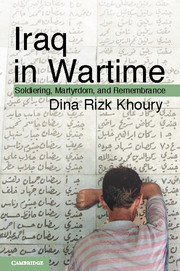Book contents
- Frontmatter
- Contents
- List of Illustrations, Maps, and Table
- Acknowledgments
- Note on Translations and Transliteration
- Maps
- 1 Introduction
- 2 Iraq’s Wars under the Ba‘th
- 3 The Internal Front
- 4 Battlefronts
- 5 Things Fall Apart
- 6 War’s Citizens, War’s Families
- 7 Memory for the Future
- 8 Commemorating the Dead
- 9 Postscript
- Appendix I Distribution in Percentage of Ba‘th Party Members, “Friends of Saddam,” and Martyrs in Fifteen Iraqi Provinces, 1998–1999
- Appendix II Percentage of Ba‘th Party Membership among Matriculating Students (Sixth Secondary) in Ten Iraqi Provinces, 1987–1988
- Appendix III Report Issued by Ali Hasan al-Majid, Head of the Northern Bureau of the Ba‘th Party to the General Secretariat, August 1987
- Sources and Bibliography
- Index
9 - Postscript
Published online by Cambridge University Press: 05 March 2013
- Frontmatter
- Contents
- List of Illustrations, Maps, and Table
- Acknowledgments
- Note on Translations and Transliteration
- Maps
- 1 Introduction
- 2 Iraq’s Wars under the Ba‘th
- 3 The Internal Front
- 4 Battlefronts
- 5 Things Fall Apart
- 6 War’s Citizens, War’s Families
- 7 Memory for the Future
- 8 Commemorating the Dead
- 9 Postscript
- Appendix I Distribution in Percentage of Ba‘th Party Members, “Friends of Saddam,” and Martyrs in Fifteen Iraqi Provinces, 1998–1999
- Appendix II Percentage of Ba‘th Party Membership among Matriculating Students (Sixth Secondary) in Ten Iraqi Provinces, 1987–1988
- Appendix III Report Issued by Ali Hasan al-Majid, Head of the Northern Bureau of the Ba‘th Party to the General Secretariat, August 1987
- Sources and Bibliography
- Index
Summary
The legacies of the Iran-Iraq and the First Gulf wars continue to shape current Iraqi politics. They are a perpetually present past. They infuse the politics of the governing elite, and they manifest themselves in the pervasive political language of victimization that shapes the way Iraqis stake their claims as citizens. The 2003 U.S.-led invasion and occupation of Iraq brought to power Shi‘i Islamist opposition and Kurdish nationalist parties that had drawn support from Iran during the Iran-Iraq war and from the United States during and after the First Gulf War. They were party as well as victim to the divisive politics and conduct of these wars. They came to power intent on creating the legal and bureaucratic mechanisms that would allow for the restoration of justice to the victims of the Ba‘thist regime’s violence, but they willfully neglected to acknowledge the deaths of Iraqi soldiers and compensate their families. The legacies of the Iran-Iraq and the First Gulf wars are distilled, for the current political elite in Iraq, into the regime’s genocidal politics toward the Kurds and its violent suppression of the Intifada. As a result, as of this writing, neither the Baghdad nor the Arbil government has attempted to develop a war narrative in a manner that could forge a pluralistic, non-authoritarian, national consensus on the legacies of Iraqis’ encounter with violence during the last twenty-three years of Ba‘thist rule.
For the Kurdish Regional Government, the legacy of the Iran-Iraq war is the ethnic cleansing of the Kurds and the complicity of the Iraqi military and the Ba‘th in the genocidal policy of the regime. The High Iraqi Tribunal, established with U.S. support after 2003, tried the architects of Anfal for crimes against humanity. Anfal and Halabja have become central to the development of a Kurdish exclusivist national identity and crucial to claims of citizenship in Iraqi Kurdistan. For the Shi‘i Islamist parties that dominate the political terrain and government of Iraq, the Iran-Iraq war was a Ba‘thist rather than a national war and their complicity in the war’s conduct is rarely addressed.
- Type
- Chapter
- Information
- Iraq in WartimeSoldiering, Martyrdom, and Remembrance, pp. 245 - 254Publisher: Cambridge University PressPrint publication year: 2013

